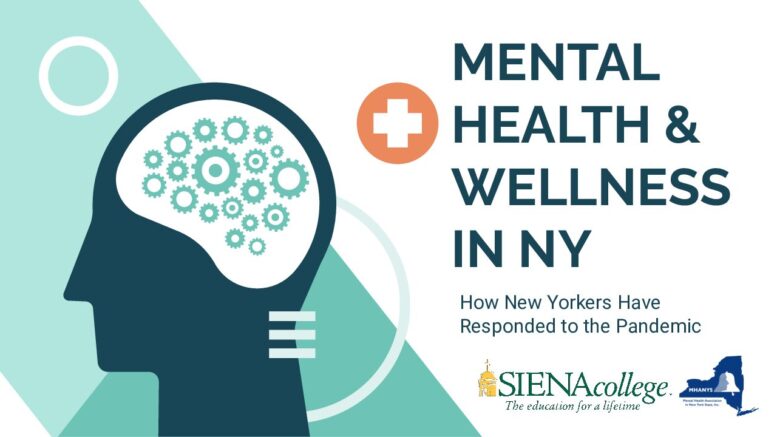MHANYS/Siena College COMD 210 Research Team:
Mental Health and Wellness in New York State
- Nearly Half Say Pandemic Negatively Impacted Mental Health; 1 in 2 Often Felt Down, Depressed, or Hopeless, But Many Found Silver Lining
- NY’ers Cite Many Mental Health Treatment Challenges: Stigma, Denial, Access, Affordability
- 85% Hopeful Most People Who Are Experiencing Mental Health Concerns Will Fully Recover
Crosstabs Press Release Presentation
Loudonville, NY – Forty-four percent of New York State residents say their mental health has been negatively impacted by the pandemic according to a new statewide survey of 751 residents conducted by student researchers as part of a Community Based Research course (COMD 210) at Siena College.
Fifty percent say they often felt down, depressed or hopeless. Still, majorities say they have looked forward to getting involved in daily activities and found time to do a new or rediscovered activity that they enjoy. Eighty-five percent of state residents say it is a somewhat or very significant problem that people downplay mental health disorders and that people are worried that they cannot access affordable treatment, while 79 percent say people are afraid to seek treatment because they do not want to be judged. Eighty-five percent are hopeful that most people who are experiencing mental health concerns during this pandemic will be able to fully recover as life returns to normal.
“New Yorkers have had a tough year as the pandemic has forced many into isolation and others into overdrive,” said Jonathan Burns, a Siena student and member of the research team that conducted this study. “A majority of New Yorkers say they have been overwhelmed by the social and political unrest in our country, have been scared to leave their house for fear of getting themselves or their families sick, and often felt down, depressed or hopeless. At least one in three people also say they have grieved many losses, there has been a high level of tension within their family, and they were not productive doing work or school remotely.”
“While a majority of state residents have faced challenging times during the pandemic, many of the same people have also found the silver linings in looking forward to getting involved in their daily activities, being able to check things off their to-do list that they have been putting off, developing a health and wellness routine, and rekindling relationships with friends and family,” Burns said.
Mental Health Challenges
New York State residents say many mental health challenges are a problem including: people downplay mental health disorders (85 percent), people are worried that they cannot access affordable treatment (85 percent), people don’t know where to start once they realize they might have a mental health concern (84 percent), people are afraid to seek treatment because they do not want to be judged (79 percent), people are reluctant to suggest to a friend or family member that they should consider seeking treatment (79 percent) and people are reluctant to use mental health and wellness services provided by their employer (72 percent).
“Stigma is still a problem today. New Yorkers say people downplay mental health disorders, and those who silently struggle do not know where to begin their journey to seek treatment,” said Nancy Rasmussen, a Siena student and member of the research team that conducted this study. “Four out of five say people are reluctant to suggest to a friend or family member that they should consider seeking treatment, yet fifty-five percent say the pandemic has had a negative impact on the mental health of people they know.”
People Are Hopeful
A majority of New Yorkers report being at least somewhat happy with eight dimensions of their overall wellness, despite going through a pandemic since March 2020. While only one-third say very happy, nearly or half of all residents say they are somewhat happy when asked about their physical health, spirituality, occupational status, environment, emotional state, financial situation, intellectual abilities, and social life.
Thirty-five percent say they are most likely to talk with someone in their personal life if they were concerned about their mental health, whereas twenty-three percent say they are most likely to turn to a trained professional to talk. Others say they would turn to exercise or physical activity (16 percent), prayer or religion (10 percent), a hobby or enjoyed activity (9 percent), or something else (3 percent).
“New Yorkers have navigated the pandemic in a variety of ways, experiencing both good times and bad, but at the end of the day, 85 percent of state residents remain hopeful that people experiencing mental health concerns during the pandemic will fully recover as a sense of normalcy returns to everyday life,” said Glenn Liebman, CEO of Mental Health Association for New York State (MHANYS).
Survey respondents were asked to consider a number of aspects of their life that may have changed as a result of going through a pandemic for 14 months, including the challenges surrounding treatment. Qualitative interviews with community members in a variety of roles were also conducted. The study was a partnership with the Mental Health Association for New York State (MHANYS). Students in the course will present the survey’s full findings to the public via Zoom on Tuesday, May 18th at 5:00 pm. Zoom details are included below.
For more information about mental health and wellness:
(518) 434-0439 or https://mhanys.org/
Zoom Link: https://siena.zoom.us/j/98926735885
###
This survey was conducted April 27-May 6, 2021 by random telephone calls to 268 New York adults via landline and cell phones and 483 responses drawn from a proprietary online panel of New Yorkers. Telephone sampling was initiated by asking for the youngest person in the household over the age of 18. Telephone sampling was conducted via a stratified dual frame probability sample of landline and cell phone telephone numbers (both from ASDE Survey Sampler) from within New York State. Data from the telephone and web samples were blended and statistically adjusted by age, race/ethnicity, gender, education, region and party to ensure representativeness. The overall results has an overall margin of error of +/- 4.2 percentage points including the design effects resulting from weighting The Siena College Research Institute, directed by Donald Levy, Ph.D., conducts political, economic, social and cultural research primarily in NYS. SCRI, an independent, non-partisan research institute, subscribes to the American Association of Public Opinion Research Code of Professional Ethics and Practices.




